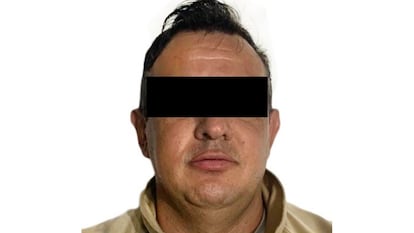La Línea drug cartel leader ‘El Ochenta’ to be tried in New Mexico on drug trafficking charges
Carlos Arturo Quintana’s extradition to the United States is linked to journalist Miroslava Breach’s murder, the massacre of the LeBaron family

Carlos Arturo Quintana isn’t one of Mexico’s most famous drug traffickers, but he’s one of the United States’ most wanted men. He has a long criminal record and has terrorized Mexico’s northern state of Chihuahua for over a decade. Known by his alias “El Ochent” a (Eighty), Quintana is one of the leaders of the La Linea (The Line) cartel, the criminal organization that forged an alliance with Rafael Caro Quintero (known as the “jefe de jefes,” or boss of bosses), in the latter’s most recent attempt to reclaim his criminal realm. Quintana belongs to the criminal group linked to the LeBaron family massacre, in which six children and three women from a Mormon community were ambushed and murdered. His nickname emerged after journalist Miroslava Breach was killed. Initially, Quintana was identified as the mastermind behind the murder, and he’s also been accused of intimidation campaigns against other journalists as well as Chihuahua’s former governor Javier Corral. After several years, Quintana was finally extradited to New Mexico last weekend, just days after Washington asked Andrés Manuel López Obrador’s government to improve security in Mexico. However, El Ochenta won’t be brought to justice for any of the aforementioned crimes; instead, he’ll be tried for building his empire by trafficking marijuana from the Chihuahua highlands.
With Quintana’s extradition, the US justice system has struck another blow against the Juarez Cartel, one of Mexico’s oldest criminal organizations, and its offshoots. La Linea first appeared as the armed wing of the Juarez Cartel; Amado Carrillo Fuentes, the so-called “Lord of the Skies,” founded La Linea in the 1980s. The genealogy of all the factions associated with the Juarez Cartel is so complex that people in the United States commonly refer to it as Vicente Carrillo Fuentes’s organization. That moniker refers to Amado’s brother, who inherited control of the cartel when the Lord of the Skies died in the 1990s. In July of this year, for example, a North Dakota court ruled in favor of four LeBaron clan families and ordered the Juarez Cartel to pay $4.6 billion in damages resulting from La Linea’s November 2019 massacre. The court’s ruling came just a few days after the authorities captured Caro Quintero.
The US has had its sights set on El Ochenta for a long time. He was extradited on an indictment from early 2011 that called Quintana one of the most prolific traffickers of marijuana across the porous New Mexico-Chihuahua border. Although his name is barely mentioned in the US indictment, he faces federal drug trafficking charges, according to a statement from the Attorney General’s Office. Quintana was not arrested in Mexico until May 2018, when he was apprehended in Namiquipa, a Chihuahua community with fewer than 25,000 inhabitants. By then, the federal authorities had already singled El Ochenta out as “the main driver of violence in Chihuahua” as National Security Commissioner Renato Sales and Secretary of the Interior Alfonso Navarrete described Quintana toward the end of Enrique Peña Nieto’s presidency.
A year before El Ochenta’s arrest, he threatened Corral. “If you continue to send me your cronies, I’m going to kill them,” a banner that appeared in March 2017 said. “You wanted war, now you’ve got it,” the message added. The feud between the drug lord and the politician went back several years. In March 2016, Miroslava Breach had published an article in which she accused Quintana of bribing several local police departments so they’d operate at his pleasure and of having an agreement with the Institutional Revolutionary Party (PRI) to run his mother-in-law as a mayoral candidate in Bachiniva, Chihuahua.
In 2016, as he was campaigning, Corral said that several PRI narco-candidates were running for office. Then, as Chihuahua’s governor-elect, he told Quintana to leave Bachiniva within 72 hours or risk being captured. By August 2016, the US Drug Enforcement Agency already considered Quintana to be a Juarez Cartel boss. In March 2017, Breach was shot to death. After the murder, three messages were identified and attributed to Quintana. However, it emerged later that the threats had been planted by a rival group, Los Salazar (the Salazars), allies of the Sinaloa Cartel; they were eventually found guilty of the journalist’s murder.
This month, different drug-trafficking groups terrorized the Mexican states of Jalisco, Guanajuato, Baja California and Chihuahua, particularly in Ciudad Juarez, where at least 9 people were killed in various episodes of violence. According to the Ministry of Defense, two of the dead were inmates who died in a dispute over prison control between the Juarez Cartel and the Pacific cartel. The wave of attacks prompted the United States to break its silence and call on Mexico to renew its bilateral commitment to fighting organized crime. “It’s time for security results,” Ambassador Ken Salazar said at a press conference last Thursday.
Hours before the violence occurred in Jalisco and Guanajuato, the US ambassador told Mexican authorities that extraditing criminals is a “very effective way to make an impact on this [type of] crime, because these criminals are there in prison [still] doing what they’ve always done.” This week, Salazar thanked Mexico “for extraditing to the United States one of the FBI’s most wanted transnational criminal organization leaders, ‘Ochenta’ of the Vicente Carrillo Fuentes Organization.”
A US Department of Justice statement said that the 40-year-old drug lord appeared in a New Mexico court for the first time last week. He will remain in custody as his case moves forward. Although Quintana was suspected of bribing the police, intimidating journalists and infiltrating Chihuahua politics, when he was captured for extradition four years ago, he was only charged with crimes that he had committed long before he rose through the cartel’s ranks to become one of northern Mexico’s most feared criminals.
Tu suscripción se está usando en otro dispositivo
¿Quieres añadir otro usuario a tu suscripción?
Si continúas leyendo en este dispositivo, no se podrá leer en el otro.
FlechaTu suscripción se está usando en otro dispositivo y solo puedes acceder a EL PAÍS desde un dispositivo a la vez.
Si quieres compartir tu cuenta, cambia tu suscripción a la modalidad Premium, así podrás añadir otro usuario. Cada uno accederá con su propia cuenta de email, lo que os permitirá personalizar vuestra experiencia en EL PAÍS.
¿Tienes una suscripción de empresa? Accede aquí para contratar más cuentas.
En el caso de no saber quién está usando tu cuenta, te recomendamos cambiar tu contraseña aquí.
Si decides continuar compartiendo tu cuenta, este mensaje se mostrará en tu dispositivo y en el de la otra persona que está usando tu cuenta de forma indefinida, afectando a tu experiencia de lectura. Puedes consultar aquí los términos y condiciones de la suscripción digital.









































